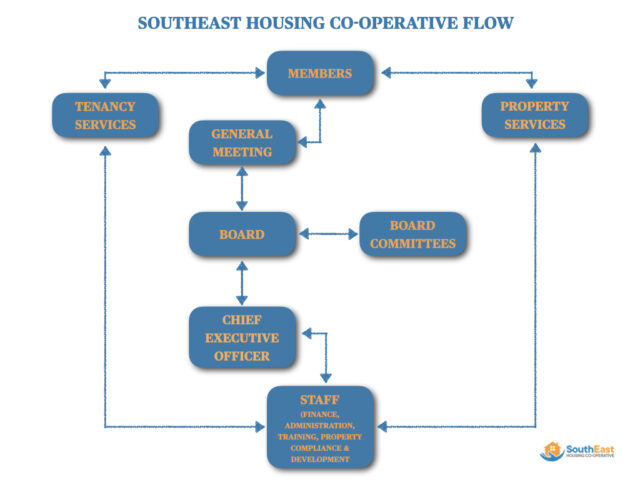The Australian
Co-operative sector

Cooperative Model
The Australian cooperative sector covers a wide range of industries, services and functions. By their very nature, successful cooperatives bring together people with a common interest and shared goals. There are cooperatives operating in each state and territory across a diverse range of industries.
Housing Cooperatives are owned by tenant/members who have a common need for affordable, secure, and environmentally sustainable housing and a commitment to cooperate.
SouthEast Housing Cooperative (SouthEast) is a non-trading cooperative without shares. The members elect the Board and the Board employs staff to provide services to the members. The board is the link between the members of SouthEast and the organisation. The board’s authority stems from and is accountable to the membership.
SEHC Building
The role of the board is to govern SouthEast so that its mission is carried out effectively, whilst acting ethically and prudently, operating within the law, the Rules and agreements with Government.
The defining point in a cooperative is that the members have a close association with the cooperative as producers or consumers of its products or services, or as its employees. However, it is the principle of “one member – one vote” which separates it from capital stock corporations.
Cooperative members learn from each other, innovate together, and by increasing control over their livelihoods build up a sense of dignity that the experience of poverty destroys.

Rental Housing Cooperatives are governed by two main pieces of legislation:
- Housing Act 1983 (Vic); esp. Part VIII to the Housing Act 1983 – Housing Registrar.
- Cooperatives National Law Application Act 2013 (Vic).
Other important legislation which directs Cooperatives include:
- Residential Tenancies Act (1997) which details the rights and duties of landlords and tenants of rented premises in Victoria.
- Australian Charities and Not for Profit Commission Act 2012
- Disability Act 1992 (Vic).
- Equal Opportunity Act 2010 (Vic).
- Privacy and Data Protection Act 2014 (Vic).
- Occupational Health and Safety Act 2004 (Vic).
- Protected Disclosure Act 2012 (Vic).
- Child Wellbeing and Safety Amendment (Child Safe Standards) Act 2015 (Vic)

Cooperative Principles
A cooperative is an autonomous association of people united voluntarily to meet their common economic, social, and cultural needs and aspirations through a jointly-owned and democratically-controlled enterprise.
Cooperatives around the world generally operate according to the same core principles and values, adopted by the International Cooperative Alliance in 1995. Cooperatives trace the roots of these principles to the first modern cooperative founded in Rochdale, England in 1844.
Cooperative Principles
The cooperative principles are guidelines by which cooperatives put their values into practice.
Voluntary and Open Membership
Cooperatives are voluntary organisations, open to all persons able to use their services and willing to accept the responsibilities of membership, without gender, social, racial, political or religious discrimination
Democratic Member Control
Cooperatives are democratic organisations controlled by their members, who actively participate in setting their policies and making decisions. In primary cooperatives members have equal voting rights (one member, one vote) and cooperatives at other levels are also organised in a democratic manner.
Member Economic Participation
Members contribute equitably to, and democratically control, the capital of their cooperative. At least part of that capital is usually the common property of the cooperative. Members usually receive limited compensation, if any, on capital subscribed as a condition of membership. Members allocate surpluses for any or all of the following purposes: developing their cooperative, possibly by setting up reserves, part of which at least would be indivisible; benefiting members in proportion to their transactions with the cooperative; and supporting other activities approved by the membership.
Autonomy and Independence
Cooperatives are autonomous, self-help organisations controlled by their members. If they enter into agreements with other organisations, including governments, or raise capital from external sources, they do so on terms that ensure democratic control by their members and maintain their cooperative autonomy.
Education, Training and Information
Cooperatives provide education and training for their members, elected representatives, managers, and employees so they can contribute effectively to the development of their cooperatives. They inform the general public -paticularly young people and opinion leaders- about the nature and benefits of cooperation.
Cooperation among Cooperatives
Cooperatives serve their members most effectively and strengthen the cooperative movement by working together through local, national, regional and international structures.
Concern for Community
Cooperatives work for the sustainable development of their communities through policies approved by their members.


